Car les dirigeants américains, en particulier ce lobby militaro-industriel qui dirige le pantin Bush (Dick Cheney dirigeait les affaires quand tout a éclaté, que Bush était à Pékin), ont là aussi installé un criminel de droit commun comme "chef d'état"
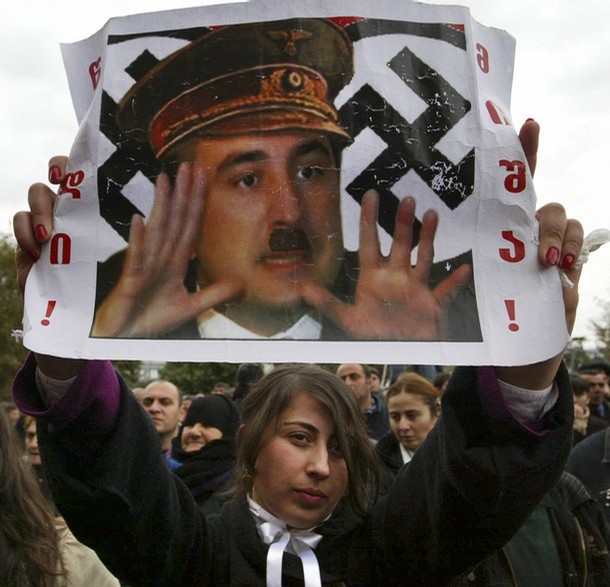
9 months ago: A Georgian opposition supporter holds a poster with a picture of Georgian President Mikheil Saakashvili made to like like Adolf Hitler during a rally in front of the parliament building in Tbilisi, 06 November 2007. Protestors demanding the resignation Saakashvili rallied for a fifth straight day Tuesday after a former defence minister dramatically appeared on television to accuse him of murder.
source : http://www.daylife.com/photo/02vsepc1o6bWw
Et c'est pour des gens pareils que Washington voudrait que nous entrions en guerre contre nos frères et soeurs de Russie, ce grand pays d'Europe qui n'est pas notre ennemi?!

Georgian soldiers carry their equipment after arriving from Iraq at Tbilisi airport on August 11. The US military has said Iraqi and US troops have replaced the Georgian contingent in Kut. The Georgian soldiers were withdrawn after the crisis with Russia.
(AFP/Vano Shlamov)
Transportés par les Américains, équipés à l'américaine, entraînés par les Américains, entourés de conseillers militaires américains, aidés pour la prise de la capitale de l'Ossétie du Sud (Tshinvali) par des conseillers militaires israéliens, et on est priés de croire que Washington est neutre et innocent.
Russia, Georgia troops battle on border
Hundreds of deaths alleged in region's capital as tanks, aircraft deploy
MSNBC News Services
updated 12:46 p.m. ET, Fri., Aug. 8, 2008
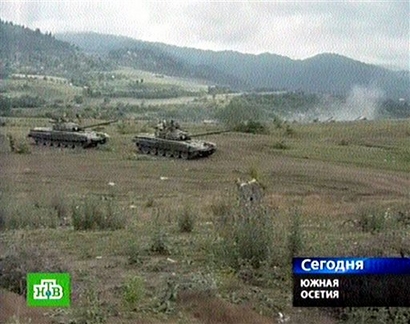
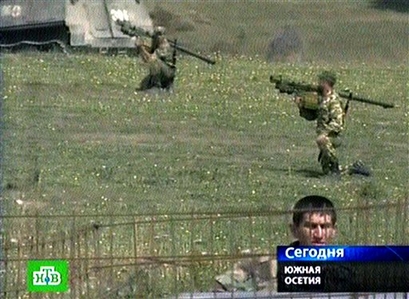
MSNBC News Services
TSKHINVALI, Georgia - Russia sent tanks and reportedly bombed Georgian air bases Friday after Georgia launched a major military offensive Friday to retake the breakaway province of South Ossetia, threatening to ignite a broader conflict.
Georgia’s pro-Western president said the two countries were at war, while the Bush administration urged both sides to reach a truce and said it was sending an envoy to the region.
Secretary of State Condoleezza Rice urged Russia to halt attacks and to withdraw combat forces from Georgian territory.
Rice said in a statement that the United States wants Russia to respect Georgian sovereignty and agree to international mediation in a bid to end the crisis in the former Soviet state that threatens to plunge the volatile region into full-scale war. In Moscow, officials said Rice spoke with Russian Foreign Minister Sergei Lavrov about the matter.
South Ossetia rebel leader Eduard Kokoity claimed there were “hundreds of dead civilians” in the region's capital of Tskhinvali, Russia’s Interfax news agency quoted him as saying. The fighting is the worst outbreak of hostilities since the province won de facto independence in a war that ended in 1992.
The roar of warplanes and the explosions of heavy shells were deafening around Tskhinvali. Many houses were ablaze.
“I saw bodies lying on the streets, around ruined buildings, in cars,” said Lyudmila Ostayeva, 50, who had fled with her family to Dzhava, a village near the border with Russia. “It’s impossible to count them now. There is hardly a single building left undamaged.”
The main hospital in Tskhinvali had ceased functioning and ambulances were unable to reach wounded civilians, the International Red Cross reported.
"As a result of many hours of shelling from heavy guns, the town is practically destroyed," Marat Kulakhmetov, commander of Russian peacekeepers in the territory, earlier told Interfax by telephone from Tskhinvali.
Russian artillery near capital
A senior Russian military commander said parts of Russia’s 58th army were outside the capital, where fighting raged between Russian-backed separatists and Georgian forces sent in on Friday to seize it.
"Georgian troop positions firing on Tskhinvali and peacekeepers were suppressed by artillery fire and tank units of the 58th Army, which are outside the capital of South Ossetia," said Russian Army Col. Igor Konashenkov.
Ten Russian peacekeepers were killed and 30 wounded when their barracks were hit in Georgian shelling, said Russian Ground Forces spokesman Col. Igor Konashenkov. Russia has soldiers in South Ossetia as peacekeeping forces but Georgia alleges they back the separatists.
Georgia's foreign ministry said Russian jets destroyed several Georgian military aircraft and inflicted unspecified casualties. It said that Russian aircraft also bombed another base in Bolnisi.
Rustavi 2 television says four people were killed and five others wounded at the Marneuli air base.
Georgia President Mikhail Saakashvili said 150 Russian tanks, armored personnel carriers and other vehicles had entered South Ossetia from neighboring Russia.
“Russia is fighting a war with us in our own territory,” Saakashvili told CNN, calling on Washington to help.
A White House spokesman said that President Bush and Russian Prime Minister Vladimir Putin had discussed the situation in Beijing, where both are attending the Olympic Games.
Bush later pledged U.S. support for Georgia's territorial integrity. "I want to reiterate on his behalf that the United States supports Georgia's territorial integrity and we call for an immediate cease-fire," White House spokeswoman Dana Perino said.
"We urge all parties, Georgians, South Ossetians and Russians, to de-escalate the tension and avoid conflict," she added.
Lavrov accused Georgia of driving people from their homes. “We are receiving reports that a policy of ethnic cleansing was being conducted in villages in South Ossetia, the number of refugees is climbing, the panic is growing, people are trying to save their lives,” he said.
Georgia has allied itself with the West and is pushing for membership in NATO, a bid strongly backed by the Bush administration. It lies at the heart of a region emerging as a vital energy transit route.
Diplomats called for another emergency session of the United Nations Security Council, its second since early Friday morning seeking to prevent an all-out war.
World distracted by Olympics?
The fighting broke out when much of the world’s attention was focused on the start of the Olympic Games and many leaders were on their way to Beijing.
The timing suggests Saakashvili may have been counting on surprise to fulfill his longtime pledge to wrest back control of South Ossetia — a key to his hold on power.
Saakashvili agreed the timing was not coincidental, but accused Russia of being the aggressor. “Most decision makers have gone for the holidays,” he told CNN. “Brilliant moment to attack a small country.”
Speaking earlier on Georgian television, Saakashvili accused Russia of sending aircraft to bomb Georgian territory, which Russia denied.
Putin did, however, warn that the Georgian attack would draw retaliation and his defense ministry pledged to protect South Ossetians, most of whom have Russian citizenship.
Georgia, which borders the Black Sea between Turkey and Russia, was ruled by Moscow for most of the two centuries preceding the breakup of the Soviet Union. The country has angered Russia by seeking NATO membership — a bid Moscow regards as part of a Western effort to weaken its influence in the region.
Georgia also has about 2,000 troops in Iraq, making it the third-largest contributor to coalition forces after the United States and Britain. On Friday, it said it would redeploy 1,000 of those troops to South Ossetia.
Georgia’s president said Russian aircraft bombed several Georgian villages and other civilian facilities.
“A full-scale aggression has been launched against Georgia,” Saakashvili said in a televised statement. He also announced a full military mobilization with reservists being called into action.
Seven civilians were wounded when three Russian Su-24 jet bombers flew into Georgia and bombed the town of Gori and the villages of Kareli and Variani, Deputy Interior Minister Eka Sguladze said at a briefing.
She said that four Russian jets later bombed Gori, the hometown of Soviet dictator Josef Stalin, but that raid didn’t cause any casualties.
Some villagers fled into Russia.
“I saw them (the Georgians) shelling my village,” said Maria, who gave only her first name. She said she and other villagers spent the night in a field and then fled toward the Russian border as the fighting escalated.
Russian official criticizes ‘dirty adventure’
A senior Russian diplomat in charge of the South Ossetian conflict, Yuri Popov, dismissed the Georgian claims of Russian bombings as misinformation, the RIA-Novosti news agency reported.
Russia’s defense ministry denounced the Georgian attack as a “dirty adventure.”
“Blood shed in South Ossetia will weigh on their conscience,” the ministry said in a statement posted on its Web site. “We will protect our peacekeepers and Russian citizens,” it said without elaboration.
Russia’s President Dmitry Medvedev later chaired a session of his Security Council in the Kremlin, vowing that Moscow will protect Russian citizens.
“In accordance with the constitution and federal law, I, as president of Russia, am obliged to protect lives and dignity of Russian citizens wherever they are located,” Medvedev said, according to Russian news reports. “We won’t allow the death of our compatriots to go unpunished.”
Saakashvili long has pledged to restore Tbilisi’s rule over South Ossetia and another breakaway province, Abkhazia. Both regions have run their own affairs without international recognition since splitting from Georgia in the early 1990s and built up ties with Moscow.
Worsening relations
Relations between Georgia and Russia worsened notably this year as Georgia pushed to join NATO and Russia dispatched additional peacekeeper forces to Abkhazia.
The Georgian attack came just hours after Saakashvili announced a unilateral cease-fire in a television broadcast late Thursday in which he also urged South Ossetian separatist leaders to enter talks on resolving the conflict.
Georgian officials later blamed South Ossetian separatists for thwarting the cease-fire by shelling Georgian villages in the area.
The Associated Press and Reuters contributed to this report.
URL: http://www.msnbc.msn.com/id/26080747/
source & (c) photos : news.yahoo.com
South Ossetian separatist fighters ride atop an armored vehicle in Dzhava, in the breakaway Georgian province of South Ossetia, Friday, Aug. 8, 2008. A surprise military offensive by Georgia, a staunch U.S. ally, to retake the breakaway province of South Ossetia reportedly killed hundreds of people Friday, triggering a ferocious counterattack from Russia that threatened to plunge the region into full-scale war.
(AP Photo/Musa Sadulayev)
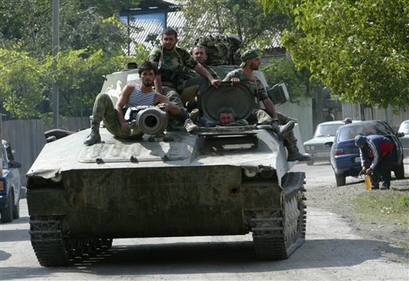
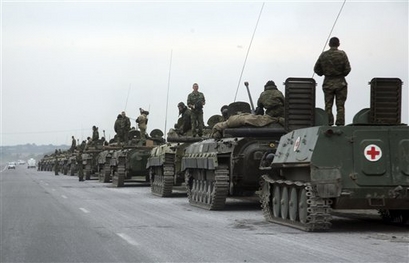
A column of Russian armored vehicles, heading towards the breakaway Georgian province of South Ossetia, are seen in North Ossetia, Russia, Friday, Aug. 8, 2008. A surprise military offensive by Georgia, a staunch U.S. ally, to retake the breakaway province of South Ossetia reportedly killed hundreds of people Friday, triggering a ferocious counterattack from Russia that threatened to plunge the region into full-scale war.
(AP Photo/Musa Sadulayev)
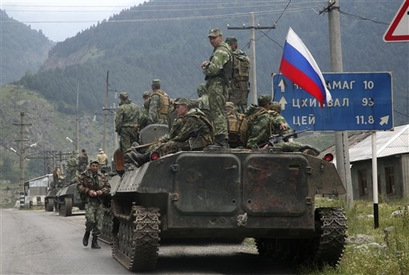
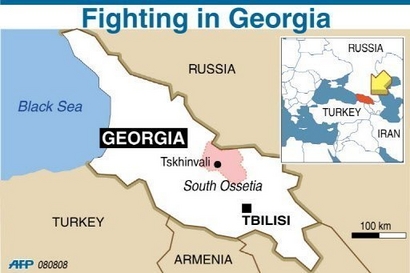
Graphic originally transmitted Aug. 9, 2008; Map locates South Ossetia where Georgian troops are fighting Russians for control of the breakaway province;
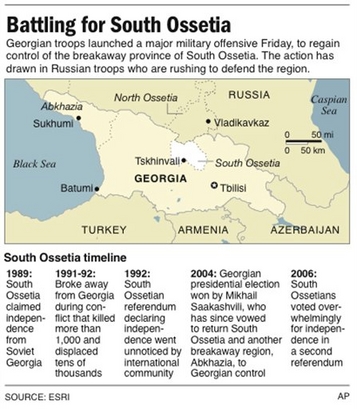
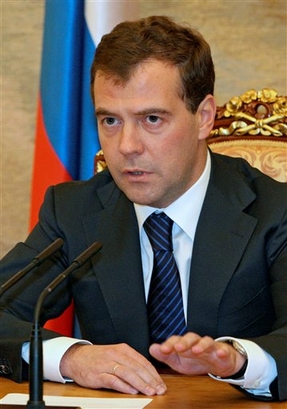
Russian President Dmitry Medvedev on Friday promised to defend Russian citizens under attack in Georgia's breakaway region of South Ossetia.
(AFPTV/RTR)
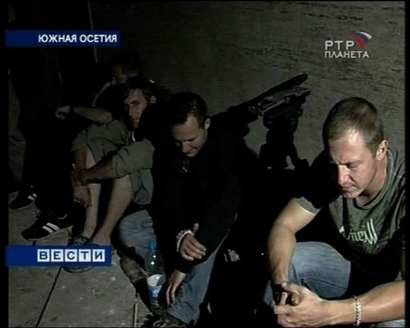
In this image, made from television, Russian tanks are moving towards the breakaway South Ossetia republic's capital, Tskhinvali, on Friday, Aug. 8, 2008. Russia's Defense Ministry says it has sent reinforcements to its peacekeepers deployed to South Ossetia to help end bloodshed. Georgian officials confirmed that the Russian convoy had crossed the border and was advancing toward Tskhinvali. Georgia launched a massive attack Friday to regain control over South Ossetia, using heavy artillery, aircraft and armor. South Ossetian officials said at least 15 people were killed Friday and an unspecified number were wounded.
(AP Photo/APTN)
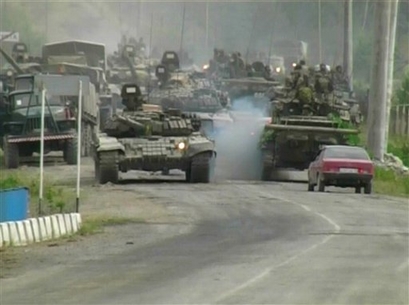
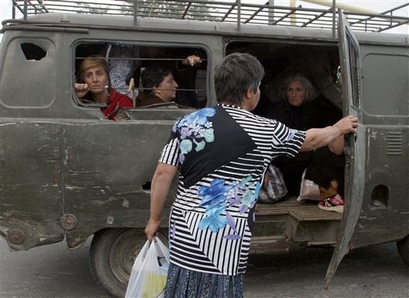
Local residents evacuate a Georgian enclave near the city of Tskhinvali, in the breakaway Georgian province of South Ossetia, Friday, Aug. 8, 2008. A sudden military offensive by Georgia, a staunch U.S. ally, reportedly killed hundreds of people Friday in the separatist region of South Ossetia and threatened to off a wider war with Russia. The fighting started when Georgia launched an attack to retake a breakaway province, followed by Russia sending in tanks and reportedly attacking two air bases in Georgia.
(AP Photo/George Abdaladze)
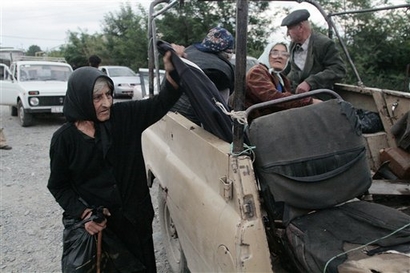
In this image, made from a television screen, women and children run to take shelter in Tskhinvali , on Friday, Aug. 8, 2008. Georgian troops launched a major military offensive Friday to regain control over the breakaway province of South Ossetia, prompting a furious response from Russia , which vowed retaliation and sent tanks into the region. Dozens were reported dead. The fighting is the worst outbreak of hostilities since the province won de-facto independence in a war against Georgia that ended in 1992 and has drawn in Russia, which maintains close ties to the South Ossetians and has peacekeepers in the region.
(AP Photo/NTV Russian Channel
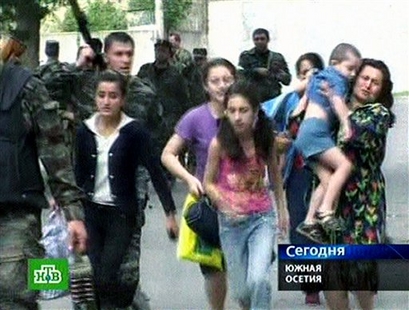
Georgian President Mikheil Saakashvili addresses the nation in Tbilisi. Russian tanks and troops surged into Georgia's breakaway South Ossetia province on Friday to repel a Georgian offensive to reclaim the region amid fighting said to have left hundreds dead.
(AFP)
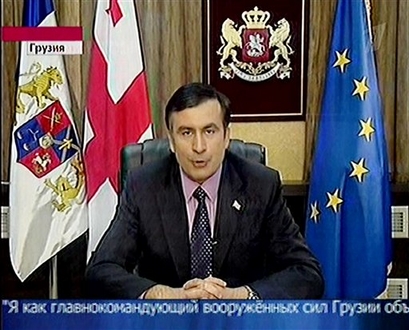
Russian Prime Minister Vladimir Putin, left, meets with Israeli President Shimon Peres in Beijing, China, Friday, Aug. 8, 2008. Putin and Peres are in Beijing to attend the opening ceremony of the Olympic games. Putin warned of retaliation Friday after Georgia launched an attack to regain control of South Ossetia, and the president pledged to protect Russian citizens in the breakaway Georgian province.
(AP Photo/Alexei Druzhinin, Pool)
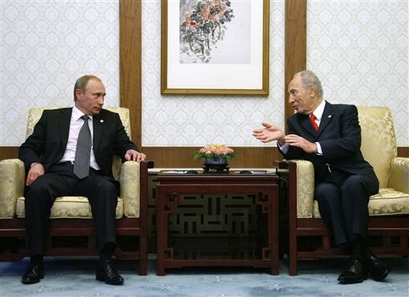
Russian Prime Minister Vladimir Putin, right, gestures as he speaks with U.S. President George W. Bush, left, during their meeting in Beijing, China, Friday, Aug. 8, 2008. The leaders are in Beijing for the opening ceremony of the Olympic Games. Putin warned Friday that Georgian attacks on South Ossetia will draw retaliation, and the Defense Ministry pledged to protect Russian citizens in the breakaway Georgian province.
(AP Photo/Anatoly Maltsev, Pool)
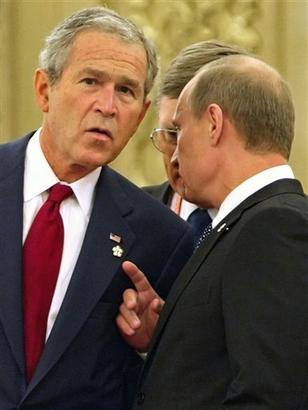
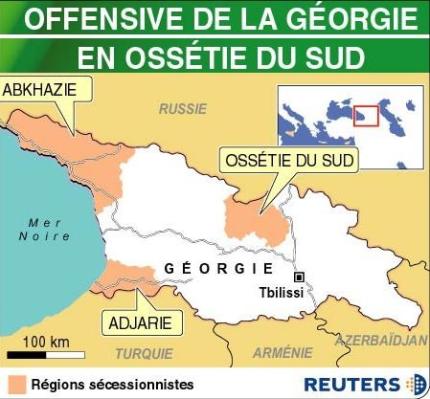
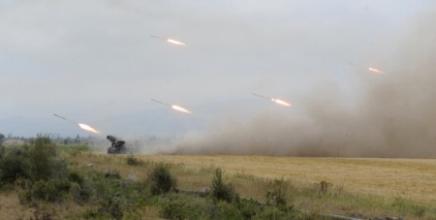
Tout d'abord, les forces armées de Géorgie ont rapidement progressé dans la république d'Ossétie du Sud, les armes des Ossètes ne faisant pas le poids
La Georgie reprend le contrôle de l'Ossétie du Sud après de violents combats
http://fr.news.yahoo.com/afp/20080808/twl-georgie-ossetie-russie-conflit-prev-d9fddae.html
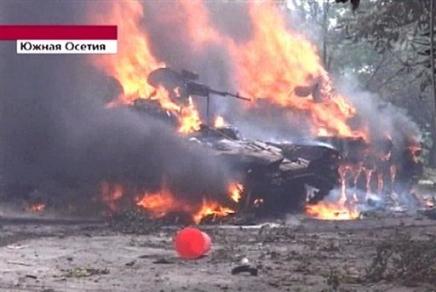
Par Amélie HERENSTEIN AFP - il y a 1 heure 43 minutes
DJAVA (Géorgie) (AFP) - La Géorgie a annoncé vendredi soir avoir repris le contrôle de la quasi-totalité de sa république rebelle d'Ossétie du Sud, où de violents affrontements ont fait plus de 1.400 morts selon le président ossète, Edouard Kokoïty.
Les forces géorgiennes "contrôlent tout le territoire de l'Ossétie du Sud, à l'exception de Djava", une localité au nord de la capitale Tsinkhvali, a déclaré le président géorgien, Mikheïl Saakachvili, dans une allocution télévisée.
"Nous contrôlons totalement Tskhinvali", a-t-il poursuivi, déplorant que 30 Géorgiens ont au total péri dans les combats.
Après une offensive géorgienne dans la nuit de jeudi à vendredi, Russes et Géorgiens se sont affrontés pour le contrôle de la république séparatiste, de facto indépendante de Tbilissi depuis la chute de l'URSS en 1991 et soutenue par Moscou.
Au cours de ces affrontements, des chars et des pièces d'artillerie russes ont "détruit" des positions géorgiennes autour de la capitale ossète, selon les agences russes.
Moscou a envoyé dans la journée de nombreux renforts vers l'Ossétie du Sud, a constaté une journaliste de l'AFP. Sur la route reliant Vladikavkaz (Russie) à Djava, des dizaines de chars russes et camions transportant troupes, munitions et matériels se sont succédés.
"Un peu plus de 1.400 personnes sont mortes (en Ossétie du Sud). Cette information sera vérifiée, mais c'est le chiffre approximatif fondé sur des informations de parents" de victimes, a déclaré dans la soirée M. Kokoïty.
Côté russe, plus de dix soldats des forces de maintien de la paix ont péri à Tskhinvali dans l'offensive géorgienne, selon le ministère russe de la Défense.
Tbilissi a accusé de son côté la Russie d'avoir bombardé plusieurs villes et bases militaires sur le territoire géorgien.
Plusieurs soldats géorgiens ont été tués dans le bombardement de la base aérienne de Marneouli (est de la Géorgie), a annoncé le secrétaire du Conseil national de sécurité géorgien à l'AFP, Alexandre Lomaïa.
Selon un correspondant de l'AFP, des avions russes ont bombardé Gori, la ville natale de l'ancien dictacteur soviétique Joseph Staline, située à l'ouest de Tbilissi.
Pour sa part, le Premier ministre russe, Vladimir Poutine, a affirmé depuis Pékin, où il assistait à l'ouverture des Jeux Olympique, que l'offensive militaire déclenchée par Tbilissi entraînerait des "mesures de rétorsion".
Dans la soirée, la Russie a annoncé l'interruption de toutes ses liaisons aériennes avec la Géorgie à compter de samedi 00H00 (vendredi 20H00 GMT).
Pendant 18 mois, d'octobre 2006 à mars 2008, Moscou avait déjà suspendu les liaisons aériennes, terrestres et maritimes entre la Russie et la Géorgie après l'arrestation dans ce pays de quatre officiers russes pour "espionnage".
De son côté, le Comité international de la Croix-Rouge (CICR) a demandé l'ouverture d'un "couloir humanitaire" en Ossétie du Sud, afin d'évacuer les blessés.
A Gori, des camions militaires transportant des soldats blessés affluaient depuis la zone de conflit vers l'hôpital.
A l'échelle internationale, les appels au cessez-le-feu se sont multipliés tout au long de la journée.
Les Etats-Unis, l'Union européenne et l'Organisation pour la sécurité et la coopération en Europe (OSCE) enverront une délégation conjointe pour tenter d'obtenir un cessez-le-feu en Ossétie du Sud, a annoncé la présidence française de l'UE.
Le Conseil de sécurité des Nations unies devait reprendre vendredi une réunion d'urgence, restée sans résultat la veille.
L'Ossétie du Sud, qui compte quelque 70.000 habitants, a proclamé son indépendance en 1992 après la chute de l'URSS et aspire à rejoindre la Fédération de Russie au côté des Ossètes du Nord. M. Saakachvili a toujours affirmé vouloir la faire revenir, tout comme l'Abkhazie, dans le giron de la Géorgie.
Ensuite, les Russes arrivant plus vite que prévu, la bonne vieille méthode d'utilisation des médias entre en piste : galvaniser son peuple et déclarer à l'étranger que l'autre qui riposte est en fait celui agresse. En général, ça paie, nos médias ne creusent jamais très loin, surtout si la ligne de conduite leur est dictée par qui les subventionne. La Géorgie ne se privera pas de cette arme qu'a si souvent utilisée un de ses plus célèbres enfants, un certain Joseph Staline.
La Géorgie accuse la Russie de l'agresser
http://fr.news.yahoo.com/rtrs/20080808/twl-georgie-ossetie-russie-bd5ae06.html
Reuters - Vendredi 8 août, 10h05
TBILISSI (Reuters) - Le président Mikhaïl Saakachvili accuse la Russie d'avoir lancé une "opération militaire à grande échelle" contre la Géorgie à la suite de l'offensive lancée par cette dernière contre les forces séparatistes d'Ossétie du Sud.
"Nous avons mobilisé des milliers de réservistes. Je vous demande de ne pas avoir peur des attaques", a déclaré le chef de l'Etat géorgien à ses compatriotes lors d'une allocution télévisée. "J'invite la Fédération russe à cesser de bombarder les villes pacifiques de Géorgie", a-t-il ajouté.
Selon le ministère géorgien de l'Intérieur trois appareils russes ont "largué des bombes" en deux endroits situées au sud de l'Ossétie du Sud, où les combats entre forces géorgiennes et séparatistes font rage.
Deux avions auraient attaqué un poste de police près de la ville de Kareli, blessant plusieurs civils, et un troisième aurait lâché une bombe près de Gori, où les forces géorgiennes s'étaient regroupées avant de lancer dans la nuit une offensive contre les séparatistes.
Selon Saakachvili, les forces géorgiennes auraient "libéré une grande partie" de Tskhinvali, la capitale d'Ossétie du Sud.
Version française Marc Delteil
http://fr.news.yahoo.com/euronews/20080807/img/pwl-l-ossetie-du-sud-et-la-a54b3a41861d0.html
Sauf qu'ici les Russes ont mis le paquet et ça a été si vite que les Américains n'ont pas eu le temps de faire monter la pression pour aider leur vassal géorgien. C'est ainsi que ce soir, le sort des armes étant devenu défavorable à la Géorgie depuis l'arrivée des troupes russes, les Géorgiens conviennent d'une trêve avec les Ossètes.

Intéressant à lire, cette liaison entre guerre et pétrole :
Le brut poursuit sa glissade malgré la Géorgie
http://fr.news.yahoo.com/rtrs/20080808/tbs-petrole-cours-7318940.html
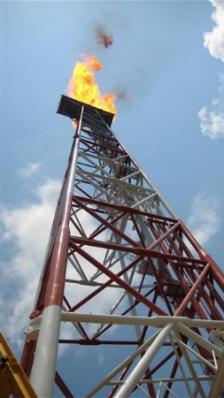
Reuters - Vendredi 8 août, 17h11
LONDRES (Reuters) - Le brut poursuit sa glissade, comme l'ensemble des matières premières, à la faveur de la hausse du dollar et en dépit du conflit dans la province géorgienne séparatiste de Géorgie du Sud.
A 15h00 GMT, le contrat septembre sur le brut léger américain perdait 3,86 dollars, soit 3,22%, à 116,16 dollars le baril et le Brent cédait 4,03 dollars (3,42%) à 113,83 dollars.
"La vigueur retrouvée du dollar a provoqué une vague de ventes", estime Peter Beutel, président de Cameron Hanover.
Vendredi, le billet vert est remonté à un plus haut de sept mois contre le yen et a approché le seuil des 1,50 dollar pour un euro.
Le conflit en Ossétie du Sud inquiète toutefois les analystes qui craignent une perturbation des exportations en provenance de la région caspienne, la Géorgie étant un Etat de transit pour le gaz et le pétrole.
Les troupes géorgiennes, soutenues par l'aviation ont réprimé la rébellion ossète, une minorité russe, incitant Moscou à envoyer ses troupes dans la région.
"Dans d'autres circonstances, cela aurait pu doper les prix de cinq dollars", commente John Kemp, économiste chez RBS Sempra."
Margaret Orgill, version française Nicolas Delame
---------------------------
update 9 août : un site internet américain rappelle l'implication directe de Washington dans la "révolution" géorgienne, dans l'entraînement de l'armée géorgienne, et dans les projets géopolitiques locaux... M. Bush ignore que jouer à la roulette russe est toujours un jeu de hasard, avec un perdant total au bout du barillet. D'où ils font tout pour favoriser même l'ennemi mortel millénaire de l'Europe, à savoir la Turquie, tout pour tenter d'écraser la Russie. Et donc écraser l'Europe, puisque la Russie est une nation européenne, au contraire de la Turquie. On lira avec intérêt l'implication directe d'Israël, cette autre nation orientale, qui se trouve sur le même continent que la Turquie, et qui a l'habitude d'accomplir les missions sales pour le compte de Washington, en échange de missiles & soutien indéfectible...
U.S. Attacks Russia Through Client State Georgia
http://www.prisonplanet.com/us-attacks-russia-through-client-state-georgia.html
While U.S. media obsesses about John Edwards’ extramarital shenanigans
Paul Joseph Watson
Prison Planet
Friday, August 8, 2008
Georgian forces, trained and equipped by the Pentagon and the U.S. government, killed 10 Russian peacekeepers early this morning in a provocation attack that has escalated into military conflict, but the subsequent corporate media coverage would have us believe that the U.S. and NATO-backed client state Georgia is a helpless victim, when in actual fact a far more nuanced geopolitical strategy is being played out.
Original reports early this morning detailed how Georgian forces had killed 10 Russian peacekeepers and wounded 30 others, which was the provocation for Russian forces to begin military operations, but the fact that Georgian forces were responsible for starting the conflagration has been completely buried in subsequent media coverage.
“Georgia and the Pentagon cooperate closely,” reports MSNBC, “Georgia has a 2,000-strong contingent supporting the U.S.-led coalition in Iraq, and Washington provides training and equipment to the Georgian military.”
The latest exercise, Immediate Response 2008, which took place last month, involved no less than one thousand U.S. troops working with Georgian troops in a war game scenario.
Moreover, the very “Rose Revolution” that brought the Harvard trained pro-US Georgian president Mikhail Saakashvilli to power in 2003 was wholly aided and abetted by the Central Intelligence Agency.
Russian fury at U.S. support for Georgia and Georgia’s aspirations of becoming a NATO member have flared regularly in recent months, with tensions also rising following U.S. attempts to place missile defense shield technology in Poland and the Czech Republic, which most observers agree has nothing to do with Iran and is in fact aimed at countering Russian military superiority in the region.
In addition, the pro-Israeli news source DebkaFile reports that Georgian infantry units were “aided by Israeli military advisors” in capturing the capital of breakaway South Ossetia, Tskhinvali earlier today.
DebkaFile elaborates on the true geopolitical significance behind today’s events.
DEBKAfile’s geopolitical experts note that on the surface level, the Russians are backing the separatists of S. Ossetia and neighboring Abkhazia as payback for the strengthening of American influence in tiny Georgia and its 4.5 million inhabitants. However, more immediately, the conflict has been sparked by the race for control over the pipelines carrying oil and gas out of the Caspian region.
The Russians may just bear with the pro-US Georgian president Mikhail Saakashvili’s ambition to bring his country into NATO. But they draw a heavy line against his plans and those of Western oil companies, including Israeli firms, to route the oil routes from Azerbaijan and the gas lines from Turkmenistan, which transit Georgia, through Turkey instead of hooking them up to Russian pipelines.
Jerusalem owns a strong interest in Caspian oil and gas pipelines reach the Turkish terminal port of Ceyhan, rather than the Russian network. Intense negotiations are afoot between Israel Turkey, Georgia, Turkmenistan and Azarbaijan for pipelines to reach Turkey and thence to Israel’s oil terminal at Ashkelon and on to its Red Sea port of Eilat. From there, supertankers can carry the gas and oil to the Far East through the Indian Ocean.
Former Treasury Secretary under Ronald Reagan, Paul Craig Roberts, told The Alex Jones Show today that the entire scenario smacked of a maneuver on behalf of the Neo-Con faction controlling the White House, led by Dick Cheney. Roberts said the date was precisely picked due to the distraction of the Olympics and Bush being out of the country.
Both Condoleezza Rice and John McCain have today demanded Russia withdraw its forces from Georgia immediately.
Meanwhile, the U.S. media networks are seemingly more interested in the complete non-story of John Edwards having an affair, while a conflict that could have devastating and thunderous geopolitical consequences fizzes on the verge of explosion.
As of early Friday evening, Edwards’ extramarital shenanigans were dominating CNN and Fox News, while Drudge also afforded the story more prominence that the situation in Georgia, which was also deemed less important than the opening ceremony of the Beijing Olympics.
One of our readers contributed the following, which explains in detail exactly what is unfolding.
----------------------------------------------------------------------Most folks on here can not or will not look up the history or facts for themselves …morons..
Those who dont learn from history are destined to repeat it..In 1992, Georgia was forced to accept a ceasefire to avoid a large scale confrontation with Russia. The government of Georgia and South Ossetian separatists reached an agreement to avoid the use of force against one another, and Georgia pledged not to impose sanctions against South Ossetia.
A peacekeeping force of Ossetians, Russians and Georgians was established at the time. And late in 1992 the OSCE set up a mission in Georgia to monitor the peacekeeping operation.
From then, until mid-2004, South Ossetia was generally peaceful.
In June 2004, tensions began to rise as the Georgian authorities strengthened their efforts against smuggling in the region. Hostage takings, shootouts and occasional bombings left dozens dead and wounded.
A ceasefire deal was reached on August 13, but it has been repeatedly violated.
Tensions in the region soared in 2008 and outbreaks of violence became increasingly frequent in the border area.
Georgia said it was an internal affair as the breakaway republic had never been recognized internationally.
The Georgian side repeatedly insisted the conflict could be resolved without outside interference.
However, early on August 8 Georgia launched a massive military offensive to take control of the republic.
A quote from another Reuters
At an emergency session of the United Nations on Thursday night, Russia failed to push through a statement that would have called on both sides to stop fighting immediately.
Council diplomats said a phrase calling on all sides to “renounce the use of force” had been unacceptable to the Georgians, backed by the United States and the Europeans.UK Times online:
Mr Saakashvili, a US-educated lawyer who succeeded Eduard Shevardnadze in 2004 and has since tried to align it more closely to the West, compared the Russian action with the invasion of Afghanistan in 1979 and appealed to the outside world to intervene.“Russia is fighting a war with us in our own territory,” he told CNN as Russian armour rolled into South Ossetia.
“It’s not about Georgia anymore. It’s about America, its values: we are a freedom-loving nation that is right now under attack.
..
Ce samedi, forts du soutien des pays occidentaux vassaux des USA, les Géorgiens ont repoussé leur cesser-le-feu, et ont repris les attaques. Les Russes ne sont pas restés en reste, bien entendu. Et la guerre médiatique, l'intox', à laquelle le président géorgien a bien été formé par ses patrons du Pentagone, continue de plus belle...
Russian troops raid Georgian town; scores dead
http://news.yahoo.com/s/ap/georgia_south_ossetia
By MUSA SADULAYEV, Associated Press Writer 13 minutes ago
OUTSIDE TSKHINVALI, Georgia - Russian tanks rumbled into the separatist province of South Ossetia and Russian aircraft bombed a Georgian town Saturday, a major escalation of the conflict that has left hundreds of civilians dead and some areas in smoldering ruins.
Georgia's Foreign Ministry said the country was "in a state of war" and accused Russia of beginning a "massive military aggression." The Georgian parliament approved a state of martial law, mobilizing reservists and ordering government authorities to work round-the-clock.
President Bush called for an end to the Russian bombings and an immediate halt to the violence.
"The attacks are occurring in regions of Georgia far from the zone of conflict in South Ossetia. They mark a dangerous escalation in the crisis," Bush said in a statement to reporters while attending the Olympic Games in Beijing.
Russian President Dmitry Medvedev said that Moscow sent troops into South Ossetia to force Georgia into a cease-fire and prevent Georgia from retaking contol of its breakaway region.
Prime Minister Vladimir Putin said Georgia had effectively lost the right to rule it — an indication Moscow could be preparing to fulfill South Ossetians' wish to be absorbed into Russia.
Georgia President Mikhail Saakashvili called it an "unprovoked brutal Russian invasion."
"This is about annihilation of a democracy on their borders," Saakashvili told the British Broadcasting Corp. "We on our own cannot fight with Russia. We want immediate cease-fire, immediate cessation of hostilities, separation of Russia and Georgia and international mediation."
Medvedev's office said Saturday evening that Russia had not received the Georgian cease-fire proposal.
Georgia, a U.S. ally whose troops have been trained by American soldiers, launched a major offensive overnight Friday. Heavy rocket and artillery fire pounded the provincial capital, Tskhinvali, leaving much of the city in ruins.
It is the worst outbreak of hostilities since South Ossetia won de facto independence in a war against Georgia that ended in 1992.
Russian Foreign Minister Sergey Lavrov told reporters Saturday in Moscow that some 1,500 people had been killed in South Ossetia since Friday, with the death toll rising. The figures could not be independently confirmed.
But Tskhinvali residents who survived the bombardment by hiding in basements and later fled the city estimated that hundreds of civilians had died. They said bodies were lying everywhere.
The risk of the conflict setting off a wider war increased Saturday when Russian-supported separatists in another breakaway region, Abkhazia, also targeted Georgian troops by launching air and artillery strikes to drive them out.
Georgia, which borders the Black Sea between Turkey and Russia, was ruled by Moscow for most of the two centuries preceding the breakup of the Soviet Union.
Both South Ossetia and Abkhazia have run their own affairs without international recognition since splitting from Georgia in the early 1990s and have built up ties with Moscow. Russia has granted its passports to most of their residents.
Putin arrived late Saturday in the Russian city of Vladikavkaz to talk to South Ossetian refugees who have fled the fighting. He said there were at least 34,000 refugees.
"The actions of the Georgian powers in South Ossetia are, of course, a crime — first of all against their own people," Putin said. "The territorial integrity of Georgia has suffered a fatal blow."
Russia also laid much of the responsibility for ending the fighting on Washington, which has trained Georgian troops. Washington, in turned, blamed Russia.
"We have urged an immediate halt to the violence and a stand-down by all troops. We call for an end to the Russian bombings, and a return by the parties to the status quo," Bush said in the statement.
White House spokesman Gordon Johndroe said Bush had spoken with both Medvedev and Saakashvili. But it was unclear what might persuade either side to stop shooting — both claim the other violated a cease-fire declared Thursday.
Alexander Lomaia, secretary of Georgia's Security Council, estimated that Russia sent 2,500 troops into Georgia. The Russian military would not comment on the number of troops — by late Saturday, Russian military commanders claimed they had driven Georgian forces out of Tskhinvali, a claim that Saakashvili denied.
Russia's ambassador to NATO Dmitry Rogozin said "98 percent of Tskhinvali" was in ruins. "Our troops have re-established control over the city," he said.
Smoke rose from the city, and intermittent artillery shelling and sporadic gunfire could still be heard.
Georgian forces knocked out about 40 Russian tanks around Tskhinvali, said Georgia's Deputy Interior Minister Eka Sguladze. "Our units are well-equipped with anti-tank rockets, and they thwarted a Russian tank attack," she told reporters.
Georgia, meanwhile, accused Russia of bombing its air bases and the town of Gori, just outside South Ossetia.
An Associated Press reporter who visited Gori shortly after the Russian airstrikes Saturday saw several apartment buildings in ruins, some still on fire, and scores of dead bodies and bloodied civilians. The elderly, women and children were among the victims.
The Russian warplanes appeared to have been targeting a military base in Gori's outskirts that also was bombed.
The Interior Ministry said Russian warplanes also bombed the Vaziani military base on the outskirts of the Georgian capital of Tbilisi and struck near the Baku-Tbilisi-Ceyhan oil pipeline. The ministry said two other military bases were hit, and that Russian warplanes also bombed the Black Sea port city of Poti, which has a sizable oil shipment facility.
Georgia said it has shot down 10 Russian planes, including four brought down Saturday, according to Lomaia. It also claimed to have captured two Russian pilots, who were shown on Georgian television.
Russian Col. Gen. Anatoly Nogovitsyn, deputy chief of the General Staff, confirmed Saturday that two Russian planes had been shot down, but did not say where or when.
Lavrov, the Russian foreign minister, said Georgia brought the airstrikes upon itself by bombing civilians and Russian peacekeepers. He warned that the small Caucasus country should expect more attacks.
"Whatever side is used to bomb civilians and the positions of peacekeepers, this side is not safe and they should know this," Lavrov said.
Russian military commanders said 15 peacekeepers have been killed and about 150 wounded in South Ossetia, accusing Georgian troops of killing and wounding Russian peacekeepers when they seized Russian checkpoints. The allegations couldn't be independently confirmed.
In Abkhazia, the separatist government said it intended to push Georgian forces out of the Kodori Gorge. The northern part of the gorge is the only area of Abkhazia that has remained under Georgian government control. Lomaia confirmed that Georgian administrative buildings in the Kodori Gorge were bombed, but he blamed the attack on Russia.
___
Associated Press writers Misha Dzhindzhikhashvili in Tbilisi, Georgia; Douglas Birch on the Russian-Georgian border; George Abdaladze in Gori, Georgia; and Jim Heintz, Vladimir Isachenkov and Lynn Berry in Moscow contributed to this report.
-------------------------
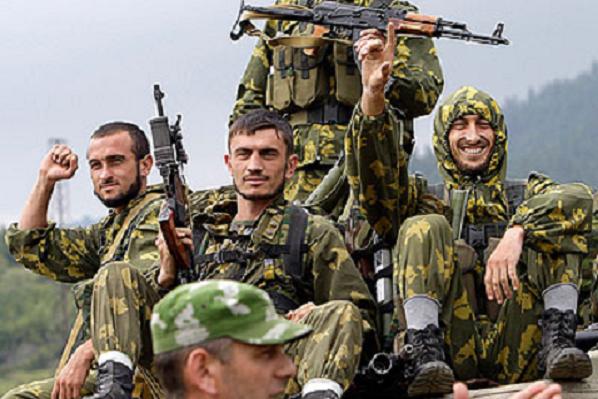
"Chechen fighters of the Russian army in South Ossetia. The Chechens are not anti-American, per CNN propaganda. Their grandfathers were heroes of the 2nd Great Patriotic War, and their great-grandfathers were heroes of World War I (the Savage Division, made up mainly of Chechen troopers was the best Russian unit of that war). A proud tradition continues! They are throwing out the Georgian trash!"
source
--------------------------
Ossétie du Sud: derrière les canons, la propagande
http://fr.news.yahoo.com/afp/20080811/tbs-russie-georgie-ossetie-conflit-propa-f41e315.html
Par Ania TSOUKANOVA AFP - il y a 42 minutes
MOSCOU (AFP) - Images chocs, déclarations enflammées, informations non vérifiables: la guerre de propagande fait rage entre la Russie et la Géorgie, à l'arrière-plan du conflit armé.
C'est Moscou qui est le plus souvent accusé d'agir sans scrupules dans ce "duel par médias interposés", selon l'expression du quotidien russe Vedomosti.
"Je ne peux plus regarder les chaînes de télévision russes. Cela me donne la nausée", écrit le journaliste russe Anton Orekh dans un article publié lundi par le quotidien en ligne Ejednevny Journal.
Femmes en pleurs, des enfants dans les bras, vieillards en état de choc, immeubles en ruines: les images fracassantes en provenance d'Ossétie du sud, république séparatiste de Géorgie soutenue par Moscou, se succèdent à la télévision russe, sur fond de musique grave.
Celles des victimes des bombardements russes en Géorgie y sont quasiment introuvables. L'inverse est tout aussi vrai à la télévision géorgienne pour les victimes ossètes.
Le nombre des civils tués en Ossétie du Sud depuis le début de l'offensive géorgienne est l'objet de toutes les surenchères. Samedi, des responsables russes faisaient état de 2.000 morts, un "mensonge flagrant", selon Tbilissi.
Quelques heures plus tard, le Premier ministre Vladimir Poutine créait la surprise en parlant "de dizaines de morts" et de "centaines de blessés". Ces propos ont été ensuite ignorés dans les journaux télévisés qui ont continué à parler de 2.000 morts.
De leur côté, les Russes reprochent aux médias occidentaux de soutenir Tbilissi. "Ils préfèrent voir l'agresseur en Russie plutôt qu'en Géorgie", dont l'offensive contre l'Ossétie du Sud a précédé l'intervention russe, écrivait lundi le quotidien russe RBC Daily.
Si le Kremlin accuse le président géorgien Mikheïl Saakachvili de perpétrer un "génocide" contre les Ossètes, Tbilissi paie les Russes en retour, en comparant leurs opérations à celles de l'URSS à Prague en 1968 et à l'invasion soviétique de l'Afghanistan en 1979.
"Si la Géorgie tombe, cela signifiera également la chute de l'Occident dans l'ensemble de l'ancienne Union soviétique et au-delà", a lancé M. Saakachvili dans une tribune publiée dans le Wall Street Journal Europe.
Dénonçant la "propagande menée (par Moscou) dans les meilleures traditions soviétiques", la Géorgie n'a pas hésité samedi à interdire la retransmission des télévisions russes sur son territoire, alors que des internautes géorgiens rapportaient des problèmes d'accès aux sites avec le domaine russe .ru.
Pour certains, Saakachvili, qui fait une partie de ses déclarations télévisées en anglais, avec un drapeau de l'Union européenne en toile de fond, tente de se servir des médias occidentaux pour présenter son pays comme une victime innocente de l'agression russe.
"Les dirigeants russes ne savent pas exposer leur point de vue à la communauté internationale", ils n'utilisent pas le relais des journalistes étrangers, note l'analyste indépendant russe Alexandre Golts, dans le Ejednevny Journal.
Même son de cloche chez Vedomosti : "Les autorités russes ont laissé leurs adversaires triompher dans un Blitzkrieg médiatique".
Un groupe de spécialistes occidentaux de communication aide la présidence géorgienne à faire passer son message, en bombardant les reporters d'un flot de communiqués en anglais.
Lundi, une conférence téléphonique avec M. Saakachvili a été "interrompue en raison d'un survol d'avions de chasse russes là où il se trouvait", a annoncé l'agence belge Aspect.
La présidence géorgienne a d'abord assuré que la situation était absolument calme, avant d'annoncer que M Saakachvili avait dû descendre brièvement dans une cave, des avions de combats russes survolant sa résidence.
-------------------------
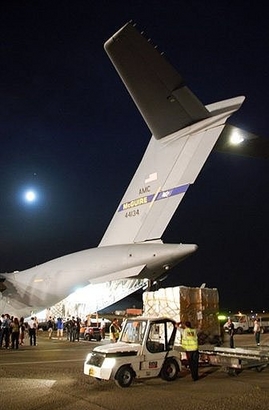
Airport employees unload a US C-17 transport plane on the tarmac at Tbilisi airport on August 13, 2008. Two more US military transports flew to Georgia Friday with medical and other relief supplies amid diplomatic efforts to defuse the conflict between Russia and Georgia, US officials said.
(AFP/File/Vano Shlamov)
bien entendu, pas d'aide US pour les Ossètes, victimes directes de l'agression géorgienne.
Et on peut faire confiance au Pentagone, ces avions ne transportent que de l'aide médicale et pas de munitions pour le matériel américain employé par les Géorgiens, ni de nouveaux conseillers "techniques" et autres "attachés culturels"..

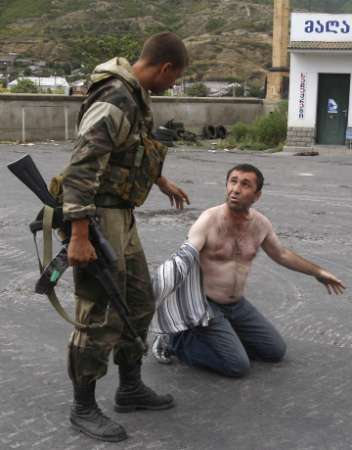
Russian soldiers detain a man who carried a weapon in his car at a checkpoint in the Georgian city of Gori, near South Ossetia, August 14, 2008. Russian President Dmitry Medvedev pledged support on Thursday for two separatist regions fighting for independence from Georgia, as Washington demanded that the war-torn country's territorial integrity be respected.
REUTERS/Gleb Garanich (GEORGIA)
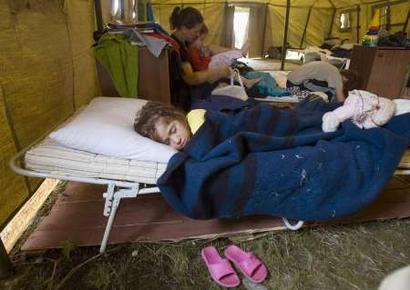
A girl from from South Ossetia sleeps in a tent in a refugee camp in the town of Alagir August 14, 2008. Georgia's parliament voted on Thursday to leave the Commonwealth of Independent States (CIS), a Russian-led grouping of ex-Soviet states, after accusing Moscow of starting a war over separatist South Ossetia.
REUTERS/Vasily Fedosenko (RUSSIA)
Georgia claims Russians have cut country in half
http://news.yahoo.com/s/ap/20080811/ap_on_re_eu/georgia_south_ossetia
By DAVID NOWAK, Associated Press Writer 34 minutes ago
GORI, Georgia - Russian forces seized several towns and a military base deep in western Georgia on Monday, opening a second front in the fighting. Georgia's president said his country had been effectively cut in half with the capture of the main east-west highway near Gori.
Fighting also raged Monday around Tskhinvali, the capital of the separatist province of South Ossetia. Russian warplanes launched new air raids across Georgia, with at least one sending screaming civilians running for cover.
The reported capture of the key Georgian city of Gori and the towns of Senaki, Zugdidi and Kurga came despite a top Russian general's claim earlier Monday that Russia had no plans to enter Georgian territory. By taking Gori, which sits on Georgia's only east-west highway, Russia can cut off eastern Georgia from the country's western Black Sea coast.
"(Russian forces) came to the central route and cut off connections between western and eastern Georgia," Georgian President Mikhail Saakashvili told a national security meeting.
The news agency Interfax, however, cited a Russian Defense Ministry official as denying Gori was captured. Attempts to reach Gori residents by telephone late Monday did not go through.
Security Council head Alexander Lomaia said Monday it was not immediately clear if Russian forces would advance on Tbilisi, the Georgian capital. But the Russian Defense Ministry denied such intentions, the Interfax and RIA-Novosti news agencies said.
At Georgia's request, U.N. Security Council in New York called an emergency session for later Monday — the fifth meeting on the fighting in as many days.
The two-front battlefield was a major escalation in the conflict that blew up late Thursday after a Georgian offensive to regain control of the separatist province of South Ossetia. Even as Saakashvili signed a cease-fire pledge Monday with EU mediators, Russia flexed its military muscle and appeared determined to subdue the small U.S. ally that has been pressing for NATO membership.
On Monday afternoon, Russian troops invaded Georgia from the western separatist province of Abkhazia while most Georgian forces were busy with fighting in the central region around South Ossetia.
Russian armored personnel carriers moved into Senaki, a town 20 miles inland from Georgia's Black Sea port of Poti, Lomaia said. Russian news agencies late Monday cited the Defense Ministry as saying the troops had left Senaki "after liquidating the danger," but did not give details.
Russian forces also moved into Zugdidi, near Abkhazia, and seized police stations, while their Abkhazian allies took control of the nearby village of Kurga, according to witnesses and Georgian officials.
In Zugdidi, an AP reporter saw five or six Russian soldiers posted outside an Interior Ministry building. Several tanks and other armored vehicles were moving through the town but the streets were nearly deserted, with shops, restaurants and banks all shut down.
In the city of Gori, an AP reporter heard artillery fire and Georgian soldiers warned locals to get out because Russian tanks were approaching. Hundreds of terrified residents fled toward Tbilisi using any means of transport they could find. Many stood along the road trying to flag down passing cars.
An APTV film crew saw Georgian tanks and military vehicles speeding along the road from Gori to Tbilisi. Firing began and people ran for cover. A couple of cars could be seen in flames along the side of the road.
Georgia borders the Black Sea between Turkey and Russia and was ruled by Moscow for most of the two centuries preceding the 1991 breakup of the Soviet Union. Both provinces of South Ossetia and Abkhazia have run their own affairs without international recognition since fighting to split from Georgia in the early 1990s — and both have close ties with Moscow.
Georgia began an offensive to regain control over South Ossetia late Thursday with heavy shelling and air strikes that ravaged South Ossetia's provincial capital of Tskhinvali.
The Russia response was swift and overpowering — thousands of troops that shelled the Georgians until they fled Tskhinvali on Sunday, and four days of bombing raids across Georgia.
Yet Georgia's pledge of a cease-fire rang hollow Monday. An AP reporter saw a small group of Georgian fighters open fire on a column of Russian and Ossetian military vehicles outside Tskhinvali, triggering a 30-minute battle. The Russians later said all the Georgians were killed.
Another AP reporter was in the village of Tkviavi, 7 1/2 miles south of Tskhinvali inside Georgia, when a bomb from a Russian Sukhoi warplane struck a house. The walls of neighboring buildings fell as screaming residents ran for cover. Eighteen people were wounded.
Georgian artillery fire was heard coming from fields about 200 yards away from the village, perhaps the bomber's target.
Hundreds of Georgian troops headed north Monday along the road toward Tskhinvali, pocked with tank regiments creeping up the highway into South Ossetia. Hundreds of other soldiers traveled via trucks in the opposite direction, towing light artillery weapons.
President Bush and other Western leaders have sharply criticized Russia's military response as disproportionate and say Russia appears to want the Georgian government overthrown. They have also complained that Russian warplanes — buzzing over Georgia since Friday — have bombed Georgian oil sites and factories far from the conflict zone.
The world's seven largest economic powers urged Russia to accept an immediate cease-fire Monday and agree to international mediation. U.S. Secretary of State Condoleezza Rice and her colleagues from the Group of Seven leading industrialized nations spoke by telephone and pledged their support for a negotiated solution to the conflict.
"I've expressed my grave concern about the disproportionate response of Russia and that we strongly condemn the bombing outside of South Ossetia," Bush told NBC Sports.
Russian Prime Minister Vladimir Putin criticized the United States for viewing Georgia as the victim, instead of the aggressor, and for airlifting Georgian troops back home from Iraq on Sunday.
"Of course, Saddam Hussein ought to have been hanged for destroying several Shiite villages," Putin said in Moscow. "And the incumbent Georgian leaders who razed ten Ossetian villages at once, who ran elderly people and children with tanks, who burned civilian alive in their sheds — these leaders must be taken under protection."
The U.S. military was flying Georgian troops back home from Iraq and informed the Russians about the flights ahead of time to avoid mishaps, said one military official said Monday on condition of anonymity because he was not authorized to speak about the subject on the record.
Defense Department spokesman Bryan Whitman said Monday morning that U.S. officials expect to have all Georgian troops out of Iraq by the end of the day.
Pentagon officials said Monday that U.S. military was assessing the fighting every day to determine whether less than 100 U.S. trainers should be pulled out of the country.
There had been about 130 trainers, including a few dozen civilian contractors, but the civilians had been scheduled to rotate out of the country and did so over the weekend, Whitman said. The remaining uniformed trainers were moved the weekend to what officials believe is a safer location, he said.
Whitman said he didn't know whether the civilian trainers were among the 170 that the State Department said it had evacuated.
Saakashvili signed a cease-fire pledge Monday proposed by the French and Finnish foreign ministers. The EU envoys headed to Moscow to try to persuade Russia to accept it.
Saakashvili, however, voiced concern that Russia's true goal was to undermine his pro-Western government. "It's all about the independence and democracy of Georgia," he said.
Saakashvili said Russia has sent 20,000 troops and 500 tanks into Georgia. He said Russian warplanes were bombing roads and bridges, destroying radar systems and targeting Tbilisi's civilian airport. One Russian bombing raid struck the Tbilisi airport area only a half-hour before the EU envoys arrived, he said.
Another hit near key Baku-Tbilisi-Ceyhan oil pipeline, which carries Caspian crude to the West. No supply interruptions have been reported.
Abkhazia's separatists declared Sunday they would push Georgian forces out of the northern part of the Kodori Gorge, the only area of Abkhazia still under Georgian control.
Before invading western Georgia, Russia's deputy chief of General Staff Col.-Gen. Anatoly Nogovitsyn demanded Monday that Georgia disarm its police in Zugdidi, a town just outside Abkhazia. Still he insisted "We are not planning any offensive."
At least 9,000 Russian troops and 350 armored vehicles were in Abkhazia, according to a Russian military commander.
Russia's Deputy Foreign Minister Grigory Karasin said more than 2,000 people have been killed in South Ossetia since Friday, most of them Ossetians with Russian passports. The figures could not be independently confirmed, but refugees who fled Tskhinvali over the weekend said hundreds had been killed.
Many found shelter in the Russian province of North Ossetia.
"The Georgians burned all of our homes," said one elderly woman, as she sat on a bench under a tree with three other white-haired survivors. "The Georgians say it is their land. Where is our land, then?"
Associated Press writers Chris Torchia reported from Zugdidi, Georgia; Misha Dzhindzhikhashvili from Tbilisi, Georgia; David Nowak from Gori, Georgia; Douglas Birch from Vladikavkaz, Russia; Jim Heintz, Vladimir Isachenkov and Lynn Berry from Moscow; and Pauline Jelinek from Washington.
-------------------------
on remarquera que les politiciens occidentaux ne demandent qu'aux Russes de cesser le combat.. or ce sont bel et bien les Géorgiens, et c'est indéniable, qui ont attaqué les premiers, les Russes ne faisant que contre-attaquer. Pourquoi demander au pompier d'arrêter d'arroser et pas au pyromane de cesser de jeter de l'huile sur le feu qu'il a lui-même allumé? Les journalistes sur place ont bien vu (voir plus haut, en anglais), que les troupes géorgiennes continuaient à affluer vers l'Ossétie et à y combattre. De qui se moque-t'on?
Il est grand temps que cette folie cesse...
-------------------------
update 15/8

Georgian workmen hang the banner for George W. Bush Street in Tbilisi on August 15. Bush, fresh from declaring Russia's offensive in Georgia "completely unacceptable," was to map out a response Saturday in talks with his top national security aides.
(AFP/Vano Shlamov)
(tiens tiens, comme au Kosovo...)
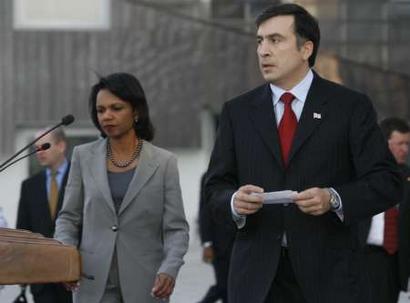
U.S. Secretary of State Condoleezza Rice (L) and Georgia's President Mikheil Saakashvili arrive to speak during a news briefing in Tbilisi, August 15, 2008. Moscow and Washington have been trading barbs over Georgia, an ally of the United States aspiring to join NATO, after Russian troops routed Georgian forces which had tried to take control of a Georgian separatist region backed by Moscow.
REUTERS/David Mdzinarishvili (GEORGIA)
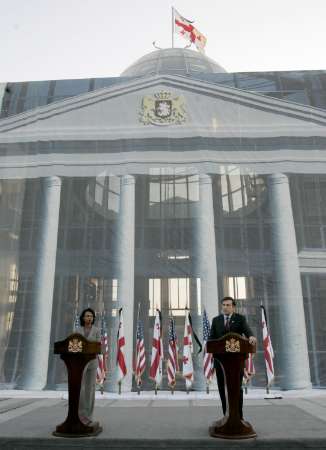
On ne les connait pas beaucoup chez nous, où tout ce qui est religieux est interdit en place publique sauf pour s'en moquer, mais là-bas, ils ont des églises actives, et des curés qui ressemblent à des curés et pas à des animateurs de groupes de rap...
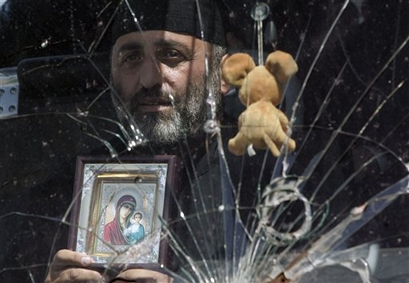
C'est ainsi que les églises de Russie et de Géorgie ont un meilleur rôle que les politiciens anglo-saxons et leurs larves serviteurs d'Europe de l'Est, elles ont cherché discrètement à aider à une résolution pacifique
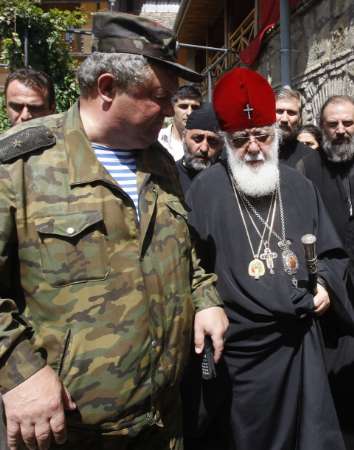
Major-General Vyacheslav Borisov (L), deputy commander of Russia's paratroopers and in command of the Gori region, speaks to Georgia's Orthodox Patriarch Ilia II as they visit the city of Gori, near South Ossetia, August 15, 2008. U.S. Secretary of State Condoleezza Rice on Friday demanded Russia withdraw all of its troops from Georgia.
REUTERS/Gleb Garanich (GEORGIA)
et elles participent à l'aide aux victimes en Ossétie, victimes qui sont les grandes oubliées des généreux dons occidentaux.
South Ossetians wait for food aid distributed by Russian Orthodox church members at a local Greek church in Tshinvali, August 15, 2008.
REUTERS/Denis Sinyakov (GEORGIA)
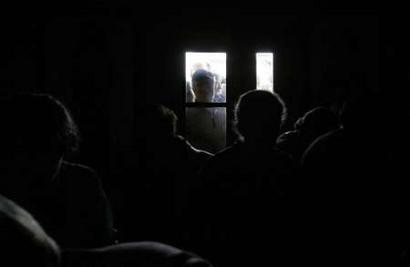
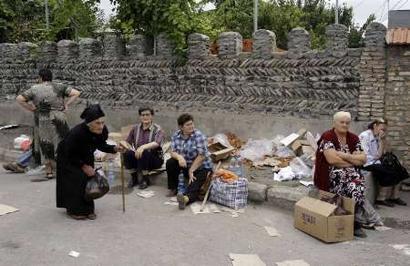
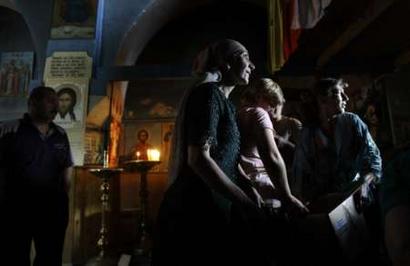
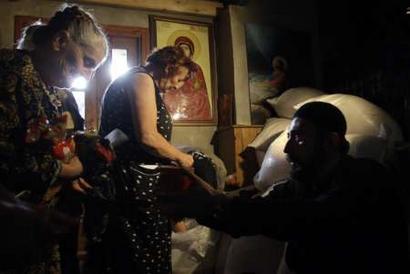

South Ossetians receive food aid distributed by the Russian Orthodox church at a local Greek church in the South Ossetian capital of Tshinvali August 15, 2008.
REUTERS/Denis Sinyakov (GEORGIA)
étonnant, non? Ahh, quand on compare avec chez nous, où nos pontifes et autres éminences se pressent aux pieds des clandestins qui ont violé nos lois et pillent notre pays, leur ouvrant les portes des églises dont les bénitiers sont transformés en urinoirs.. des bons samaritains en soutane dont la pitié est à géométrie variable, car la population locale ne doit pas compter sur leur charité sans bornes... si c'est pour des non-étrangers, la borne est vite atteinte..
--------------------------------------
update 16/8
la situation des armées en présence :
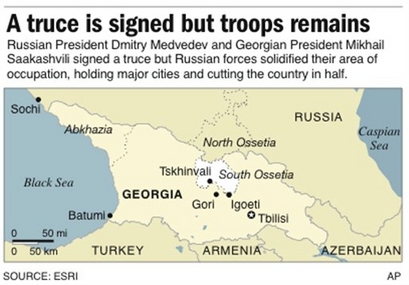

Abhazian soldiers salute their flag in Sukhumi, the capital of Georgia's breakaway region. US President George W. Bush has said Russia's signing of a peace deal over its conflict with Georgia is a "hopeful step" but he warned that breakaway regions Abkhazia and South Ossetia must remain part of Georgia.
(AFP/Viktor Drachev)
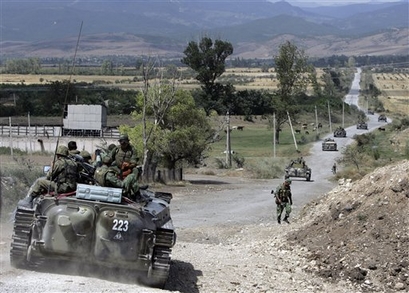
Russian armored vehicles move in Orjosani, between the capital Tbilisi and strategic town of Gori, Georgia, Saturday, Aug. 16, 2008. Russian President Dmitry Medvedev signed a truce with Georgia on Saturday, a definitive step toward ending the fighting there despite the uncertainty on the ground reflected by Russian soldiers digging in just 30 miles from the Georgian capital.
(AP Photo/Darko Bandic)

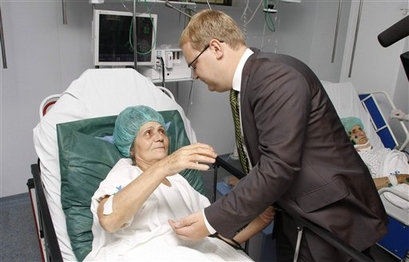
Estonian Foreign Minister Urmas Paet, right, visits the wounded at a hospital in Tbilisi, Georgia, Saturday, Aug. 16, 2008. Russian President Dmitry Medvedev signed the cease-fire plan on Saturday, a day after his Georgian counterpart, President Mikhail Saakashvili, reluctantly agreed to the pact after lengthy talks with Washington's top diplomat, Condoleezza Rice.
(AP Photo/Georgy Abdaladze)
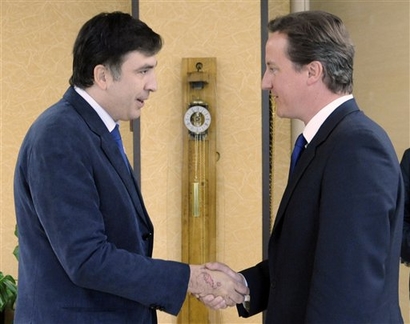
Georgia's President Mikheil Saakashvili, left, greets Britain's opposition Conservative party leader David Cameron, right, in Tbilisi, Saturday, Aug. 16, 2008. Russian President Dmitry Medvedev signed the cease-fire plan on Saturday, a day after his Georgian counterpart, President Mikhail Saakashvili, reluctantly agreed to the pact after lengthy talks with Washington's top diplomat, Condoleezza Rice.
(AP Photo/Irakli Gedenidze, Pool)
copyright photos yahoo
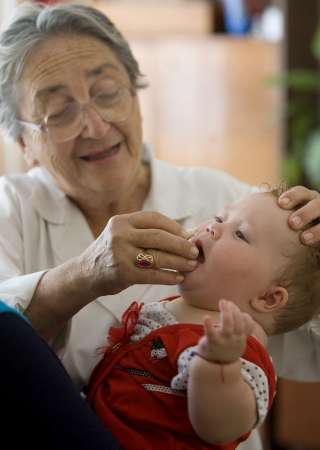
A child from South Ossetia receives medical treatment at a refugee camp near the town of Alagir, August 16, 2008. Russia defied U.S. demands for an immediate pullout of its troops from Georgia on Saturday, saying extra security arrangements needed to be put in place before a withdrawal could begin.
REUTERS/Vasily Fedosenko (RUSSIA
la Russie annonce la couleur, ok pour un cessez-le-feu, mais pas d'accord pour forcer Abkhazie et Ossétie du Sud à se soumettre à une Géorgie qui vient de commettre massacres sur massacres en Ossétie, grâce au bon matériel US...
Medvedev Backs Independence Bids
http://www.moscowtimes.ru/article/600/42/369810.htm
15 August 2008By Nabi Abdullaev, Nikolaus von Twickel / Staff WritersPresident Dmitry Medvedev signaled Thursday that he would support independence bids by Georgia's separatist provinces of Abkhazia and South Ossetia, as Russian troops roamed in Georgia proper, prompting outcries that Moscow was violating a truce reached with Tbilisi this week.
"We will support any decisions made by the people of South Ossetia and Abkhazia ... and not only will we support them, but we will guarantee them both in the Caucasus and throughout the world," Medvedev told Abkhaz leader Sergei Bagapsh and his South Ossetian counterpart, Eduard Kokoity, in the Kremlin.
The two separatist leaders were in Moscow to sign a document outlining the principles for a settlement of the Russian-Georgian conflict.
Russian troops poured into South Ossetia last Friday, rebuffing an attempt by Georgia's military to reclaim South Ossetia by force. Having routed Georgian units in the separatist region, the troops then moved into Georgia proper, saying it needed to destroy Georgian military bases and positions near the towns of Gori and Senaki to protect South Ossetia from further attacks.
Abkhazia and South Ossetia have long sought to be recognized as independent states. Russia never objected to their bids but formally pledged to respect Georgia's territorial integrity.
This week's truce says nothing about Georgia's territorial integrity, and Foreign Minister Sergei Lavrov made it clear Thursday that the issue was not open for discussion. "You can forget about any talk about Georgia's territorial integrity because, I believe, it is impossible to persuade South Ossetia and Abkhazia to agree with the motion that they can be forced back into the Georgian state," Lavrov told reporters.
Lavrov later told Ekho Moskvy radio that mentioning Georgia's territorial integrity in any document connected to the settlement of the conflict would be regarded by South Ossetians and the Abkhaz as a "profound offense of human dignity."
U.S. White House spokesman Dana Perino told reporters Thursday that the administration of President George W. Bush considers such talk "bluster" and would ignore it.
With Russian forces firmly entrenched in its heartland, Georgia remained locked in a tense atmosphere, leading the government in Tbilisi to call for international intervention.
Lavrov said Russia would welcome foreign participation in peacekeeping in Georgia's separatist republics.
In Gori, the birthplace of Soviet dictator Josef Stalin, Georgian officials accused a contingent of Russian paratroopers of mining and looting the town instead of honoring an agreement to pull out and hand over authority to the Georgian police force.
Russian forces also continued to hold the western towns of Zugdidi, Senaki and Poti, but the situation there was more relaxed, local residents and the government in Tbilisi said.
The Russian commander in charge of forces in Gori, Vyacheslav Borisov, promised late Wednesday that his men would hand over power and leave by Friday. "We will go home tomorrow and the day after, but now we have to restore order," Borisov, a burly man in fatigues and a camouflage cap, told reporters at a checkpoint just outside the city limits.
The general said his troops were collecting weapons and military equipment left behind by the Georgian army when it retreated from South Ossetia after being overwhelmed by Russian troops last Friday. "They left everything, 1,000 American-made rifles, 40 armored personnel carriers and ammunition. This is highly dangerous to leave lying around," Borisov said. He added that his troops would guard what they found and then confiscate them.
But on Thursday, the Georgian Interior Ministry complained that Borisov's soldiers had reneged on their agreement to hand over control. "We had an agreement to send police forces into Gori today," ministry spokesman Shota Utiashvili said. "But when our men came, they were not let into town and were then sent away."
Dmitry Astakhov / AP
Medvedev meeting with Bagapsh and Kokoity in the Kremlin on Thursday.
The Russians explained that they needed more time, Utiashvili said.
Georgia's Foreign Ministry complained that the Russians were mining the town and said Russian forces were looting the Senaki military base and the Poti naval port, "destroying the property of the Georgian state."
A senior Russian Defense Ministry official, speaking on condition of anonymity, dismissed Georgia's complaint about troops in Senaki and Poti as "nothing more than another propagandist provocation," Interfax reported.
Borisov said his troops were not in Gori but only in the outskirts, and he said the local administration had fled upon his arrival: "When we came here ... there was no one in charge. So I called Tbilisi and asked them to send people to govern this place," he said, presenting a new mayor, Alexander Maisuradze.
Residents said they were desperate because the town had been deserted by much of its population of more than 40,000. "The Russians provide some stability, but we are all panicking," said Megi Abashidze, speaking by telephone with a reporter in Tbilisi.
She said that Wednesday night had been quiet but that residents had preferred to stay indoors. There was no gunfire, but explosions could be heard from a tank facility outside town where the Russians were destroying Georgian military vehicles, she said, adding, "We just want peace, peace, please."
Russia's Defense Ministry said its troops in Georgia might have opened fire Thursday but only to suppress fire from Georgian units.
U.S. Secretary of State Condoleezza Rice, as she stopped in Paris on her way to Tbilisi, called on Russia to honor the cease-fire with Georgia. Rice said Thursday that she would ask Saakashvili to sign a cease-fire document that will pave the way for withdrawal of Russian troops.
US Secretary of Defense Robert Gates said Thursday he sees no need to deploy US fighting forces to Georgia, The Associated Press reported.
Lavrov on Thursday also telephoned his Georgian counterpart, Eka Tkeshelashvili, Georgia's Foreign Ministry said. It said Tkeshelashvili had complained that Russia was not honoring the cease-fire and Lavrov "could not answer the questions of Georgia's foreign minister." In a separate move, Georgia's parliament voted unanimously Thursday to pull the country out of the Russia-dominated Commonwealth of Independent States.
Kremlin may be bluffing over its future recognition of Abkhazia and South Ossetia as independent states, political analysts said.
Recognizing the separatist republics would not contribute to Russia's security and economic interests in the region and would come at great diplomatic cost, said Alexander Khramchikhin, a senior researcher with the Institute of Political and Military Analysis.
Also, by recognizing the separatists, the Kremlin would lose the right to criticize the West over Kosovo's independence bid, which many Western countries have recognized as similar to Ossetia's, said Nikolai Silayev, a Caucasus analyst with the Moscow State Institute of Foreign Relations.
Journalists covering the conflict spoke of harassment. Alexandra Szacka, the Moscow bureau chief for Canada's CBC Television, said Russian troops stood idly by as an armed man seized her Mitsubishi Pajero as she was standing in a convoy of about 100 journalists outside Gori on Thursday.
She said the attacker, dressed in fatigues, got out of a white car and suddenly fired a gun in the air. "Everybody fled, but I continued filming him shooting. That is probably why he went at me with his gun and took our car," she said upon returning to Tbilisi.
Szacka said three other cars were seized as well. On Wednesday, attackers outside Gori took a car and equipment from a camera team of British Sky News.
In Zugdidi, a town of 70,000 on the border with Abkhazia, Russian forces were patrolling the streets Thursday after disarming local police forces, a local member of the United Nations mission said. "But otherwise, the situation is pretty calm," he said, speaking on condition of anonymity because he was not authorized to speak to the press.
Gia Nodia, Georgia's education and science minister, said that while Tbilisi had suffered human and territorial losses, a positive outcome could be that the conflict had ended uncertainty about the country's relations with Russia. "We can enter a healthier stage ... in which we see much clearer what [Russia] wants," he said in an interview in his office in Tbilisi.
Yet Nodia was skeptical that relations with Moscow would improve soon and accused Prime Minister Vladimir Putin of having a "personal obsession with Georgia. "As long as Putin is in charge, being Russia-friendly means being subservient to and slavish to Russia," he said.
Staff Writer Nabi Abdullaev reported from Moscow; Staff Writer Nikolaus von Twickel reported from Tbilisi.
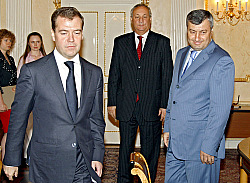
photo Dmitry Astakhov / AP
Medvedev meeting with Bagapsh and Kokoity in the Kremlin on Thursday.

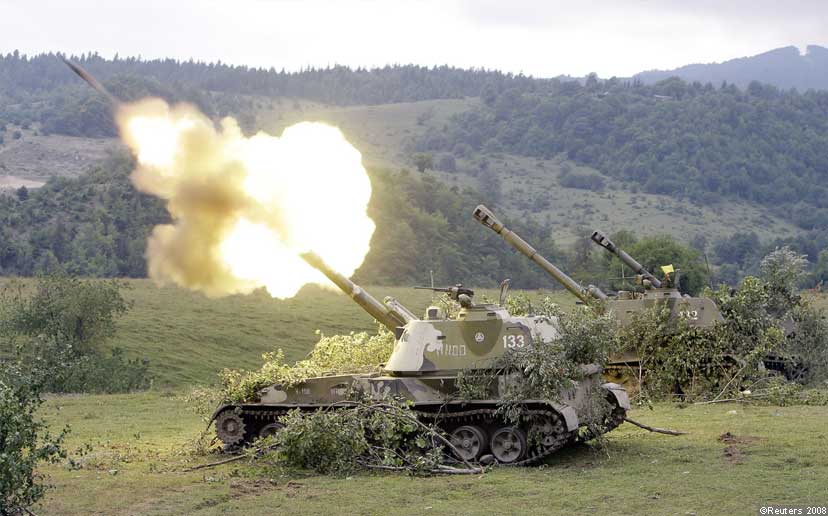
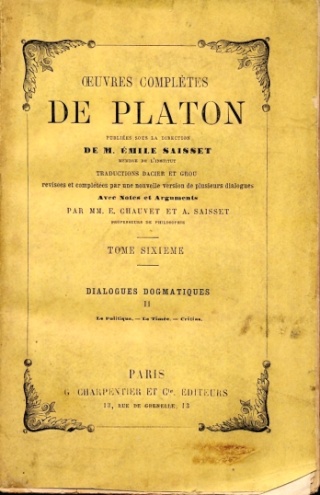


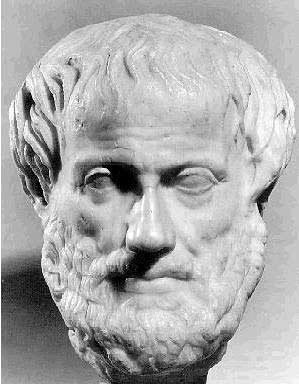
Aucun commentaire:
Enregistrer un commentaire